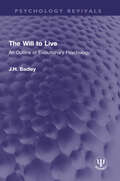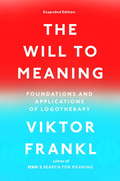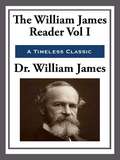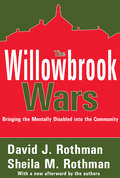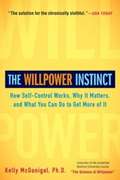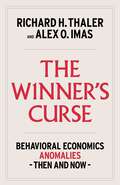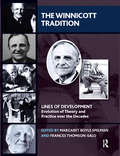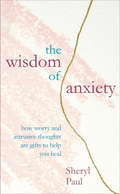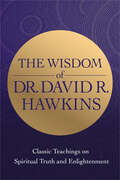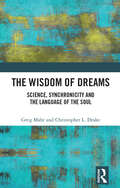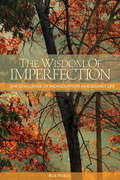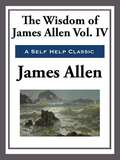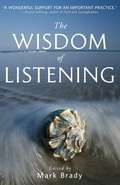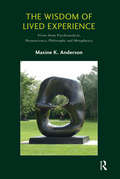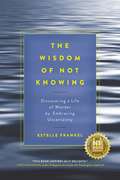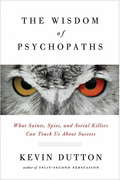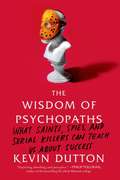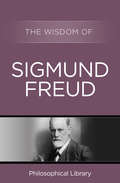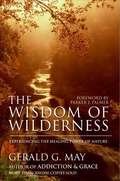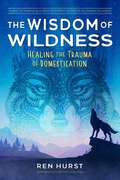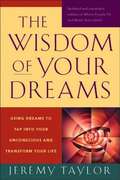- Table View
- List View
The Will to Live: An Outline of Evolutionary Psychology (Psychology Revivals)
by J.H. BadleyFirst published in 1931, the underlying assumption of The Will to Live is that of a psychological evolution in which mind is regarded not merely as developing in association with nervous and cerebral development, but as being itself the most important factor in the process. It is this assumption which gives meaning to the title that has been chosen for the book. It brings themes like is psychology a science; impulse and growth; the rise of consciousness; the three main lines of instinct; the variability of habit; development of intelligence; thought as judgment and reflection; the critical faculty; simple and complex emotions; ideals and idealization; voluntary activity; sex and conflict; and buried complexes and dreams. This is an interesting historical document for the students of psychology.
The Will to Meaning: Foundations and Applications of Logotherapy
by Viktor E. FranklHolocaust survivor Viktor E. Frankl converted the horrors he experienced in a German concentration camp into the pioneering philosophy he called logotherapy. Unlike Freud's "will to pleasure" and Adler's "will to power," Frankl based logotherapy on three things: the freedom of will, the will to meaning, and the meaning of life. By presenting three methodological concepts, Frankl shows how we can all reinvigorate our experiences and tie them to will and power. Originally published in 1988 and compiling Frankl's speeches on logotherapy, The Will to Meaning is regarded as a seminal work of behavior therapy.
The William James Reader
by William JamesWilliam James was the older brother of novelist Henry James, and a pioneering psychologist and philosopher. His works pushed the boundaries of psychology and helped shape the direction the field would grow in. Collected here are four of his most important books: Essays in Radical Empiricism, The Meaning of Truth, The Varieties of Religious Experience, and What is an Emotion? These books helped forge a field and remain as important today as when they were first written!
The Willowbrook Wars: Bringing the Mentally Disabled into the Community
by David J. RothmanThe Willowbrook Wars is a dramatic and illuminating account of the effort to close down a scandal-ridden institution and return its 5,400 handicapped residents to communities in New York. The wars began in 1972 with Geraldo Rivera's televised raid on the Willowbrook State School. They continued for three years in a federal courtroom, with civil libertarian lawyers persuading a conservative and conscience-stricken judge to expand the rights of the disabled, and they culminated in a 1975 consent decree, with the state of New York pledging to accomplish the unprecedented assignment in six years.From 1975 to 1982, David and Sheila Rothman observed this remarkable chapter in American reform of mental disabilities care. Would the state live up to its agreement without "dumping" residents into other nightmarish institutions? Would the lawyers prove as interested in meeting client needs as in securing client rights? Could a tradition-bound bureaucracy create a new network of community services? And finally, would a governor and a legislature tolerate such outside intervention, and if so, for how long? In answering these questions,The Willowbrook Wars takes us behind the scenes to clarify the role of the judiciary, the fate of the underprivileged, and the potential for social justice. In their new afterword, the authors bring the story up to date, describing the results of the closing of the institution in 1987 from the experiences of integrating the former residents into communities to the legal battles between the state of New York and advocates for the mentally handicapped.
The Willpower Instinct
by Kelly McgonigalBased on Stanford University psychologist Kelly McGonigal's wildly popular course "The Science of Willpower," The Willpower Instinct is the first book to explain the new science of self-control and how it can be harnessed to improve our health, happiness, and productivity. Informed by the latest research and combining cutting-edge insights from psychology, economics, neuroscience, and medicine, The Willpower Instinct explains exactly what willpower is, how it works, and why it matters. For example, readers will learn: Willpower is a mind-body response, not a virtue. It is a biological function that can be improved through mindfulness, exercise, nutrition, and sleep. Willpower is not an unlimited resource. Too much self-control can actually be bad for your health. Temptation and stress hijack the brain's systems of self-control, but the brain can be trained for greater willpower Guilt and shame over your setbacks lead to giving in again, but self-forgiveness and self-compassion boost self-control. Giving up control is sometimes the only way to gain self-control. Willpower failures are contagious--you can catch the desire to overspend or overeat from your friends--but you can also catch self-control from the right role models. In the groundbreaking tradition of Getting Things Done, The Willpower Instinct combines life-changing prescriptive advice and complementary exercises to help readers with goals ranging from losing weight to more patient parenting, less procrastination, better health, and greater productivity at work.
The Willpower Instinct: How Self-Control Works, Why It Matters, and What You Can Do to Get More of It
by Kelly McgonigalBased on Stanford University psychologist Kelly McGonigal's wildly popular course "The Science of Willpower," The Willpower Instinct is the first book to explain the new science of self-control and how it can be harnessed to improve our health, happiness, and productivity.Informed by the latest research and combining cutting-edge insights from psychology, economics, neuroscience, and medicine, The Willpower Instinct explains exactly what willpower is, how it works, and why it matters. For example, readers will learn:Willpower is a mind-body response, not a virtue. It is a biological function that can be improved through mindfulness, exercise, nutrition, and sleep.Willpower is not an unlimited resource. Too much self-control can actually be bad for your health.Temptation and stress hijack the brain's systems of self-control, but the brain can be trained for greater willpowerGuilt and shame over your setbacks lead to giving in again, but self-forgiveness and self-compassion boost self-control.Giving up control is sometimes the only way to gain self-control.Willpower failures are contagious--you can catch the desire to overspend or overeat from your friends--but you can also catch self-control from the right role models.In the groundbreaking tradition of Getting Things Done, The Willpower Instinct combines life-changing prescriptive advice and complementary exercises to help readers with goals ranging from losing weight to more patient parenting, less procrastination, better health, and greater productivity at work.
The Willpower Instinct: How Self-Control Works, Why It Matters, and What You Can Do to Get More of It
by Kelly McgonigalBased on Stanford University psychologist Kelly McGonigal's wildly popular course "The Science of Willpower," The Willpower Instinct is the first book to explain the new science of self-control and how it can be harnessed to improve our health, happiness, and productivity.Informed by the latest research and combining cutting-edge insights from psychology, economics, neuroscience, and medicine, The Willpower Instinct explains exactly what willpower is, how it works, and why it matters. For example, readers will learn:Willpower is a mind-body response, not a virtue. It is a biological function that can be improved through mindfulness, exercise, nutrition, and sleep.Willpower is not an unlimited resource. Too much self-control can actually be bad for your health.Temptation and stress hijack the brain's systems of self-control, but the brain can be trained for greater willpowerGuilt and shame over your setbacks lead to giving in again, but self-forgiveness and self-compassion boost self-control.Giving up control is sometimes the only way to gain self-control.Willpower failures are contagious--you can catch the desire to overspend or overeat from your friends--but you can also catch self-control from the right role models.In the groundbreaking tradition of Getting Things Done, The Willpower Instinct combines life-changing prescriptive advice and complementary exercises to help readers with goals ranging from losing weight to more patient parenting, less procrastination, better health, and greater productivity at work.
The Willpower Instinct: How Self-Control Works, Why It Matters, and What You Can Do to Get More of It
by Kelly McgonigalBased on Stanford University psychologist Kelly McGonigal's wildly popular course "The Science of Willpower," The Willpower Instinct is the first book to explain the new science of self-control and how it can be harnessed to improve our health, happiness, and productivity.Informed by the latest research and combining cutting-edge insights from psychology, economics, neuroscience, and medicine, The Willpower Instinct explains exactly what willpower is, how it works, and why it matters. For example, readers will learn:Willpower is a mind-body response, not a virtue. It is a biological function that can be improved through mindfulness, exercise, nutrition, and sleep.Willpower is not an unlimited resource. Too much self-control can actually be bad for your health.Temptation and stress hijack the brain's systems of self-control, but the brain can be trained for greater willpowerGuilt and shame over your setbacks lead to giving in again, but self-forgiveness and self-compassion boost self-control.Giving up control is sometimes the only way to gain self-control.Willpower failures are contagious—you can catch the desire to overspend or overeat from your friends—but you can also catch self-control from the right role models.In the groundbreaking tradition of Getting Things Done, The Willpower Instinct combines life-changing prescriptive advice and complementary exercises to help readers with goals ranging from losing weight to more patient parenting, less procrastination, better health, and greater productivity at work.
The Winner's Curse: Behavioral Economics Anomalies, Then and Now
by Richard H. Thaler Alex ImasNobel Prize winner Richard H. Thaler and rising star economist Alex O. Imas explore the past, present, and cutting-edge future in behavioral economics in The Winner&’s Curse.Why do people cooperate with one another when they have no obvious motivation to do so? Why do we hold on to possessions of little value? And why is the winner of an auction so often disappointed? Over thirty years ago, Richard H. Thaler introduced readers to behavioral economics in his seminal Anomalies column, written with collaborators including Daniel Kahneman and Amos Tversky. These provocative articles challenged the fundamental idea at the heart of economics that people are selfish, rational optimizers, and provided the foundation for what became behavioral economics. That was then. Now, three decades later, Thaler has teamed up with economist Alex O. Imas to write a new book with an original and creative format. Each chapter starts with an original Anomaly, retaining the spirit of its time stamp. Then, shifting to the present, the authors provide updates to each, asking how the original findings have held up and how the field has evolved since then. It turns out that the original findings not only hold up well, but they show up almost everywhere. Anomalies pop up in people&’s decisions to save for retirement and how they carry outstanding credit card debt. Even experts fail to optimize. The key concept of loss aversion explains missed putts by PGA pros and the selection of which stocks to sell by portfolio managers. In this era of meme stocks and Dogecoin, it is hard to defend the view that financial markets are highly efficient. The good news, however, is that the anomalies have gotten funnier. With both readability and rigor, The Winner&’s Curse is for anyone, from those with a cursory understanding of economics to fellow economists. Each chapter provides a key insight into human behavior so readers learn how to better understand the choices made by their friends, colleagues, and customers, and they might just become better at making decisions themselves. Only recommended for humans.
The Winnicott Tradition: Lines of Development-Evolution of Theory and Practice over the Decades (The\lines Of Development - Evolution Of Theory And Practice Over The Decades Ser.)
by Frances Thomson-Salo Margaret Boyle SpelmanThis book includes articles that describe how Winnicott's thinking facilitates the building of bridges between the internal and external realities, and, outside the boundaries of psychoanalysis as well as within it, between different schools of thought.
The Wisdom Of The Ego
by George E. VaillantOne of America's preeminent psychiatrists draws on his famous Study of Adult Development to give us an exhilarating look at how the mind's defenses work. What we see as the mind's trickery, George Vaillant tells us, is actually healthy. What's more, it can reveal the mind at its most creative and mature, soothing and protecting us in the face of unbearable reality, managing the unmanageable, ordering disorder. And because creativity is so intrinsic to this alchemy of the ego, Vaillant mingles his studies of obscure lives with psychobiographies of famous artists and others--including Florence Nightingale, Sylvia Plath, Anna Freud, and Eugene O'Neill.
The Wisdom of Anxiety: How worry and intrusive thoughts are gifts to help you heal
by Sheryl Paul'We have to shift from a mindset of shame, which sees anxiety as evidence of brokenness, to a mindset of curiosity, which recognizes that anxiety is evidence of our sensitive heart, our imaginative mind and our soul's desire to grow towards wholeness.' Three million people are thought to suffer from anxiety in the UK, and it is an issue that affects a growing number of people across all ages. For anyone troubled by obsessive thoughts, insomnia and other manifestations of anxiety, counsellor Sheryl Paul offers shelter in the storm. In The Wisdom of Anxiety, Paul reveals that anxiety, like any emotion, is a signal - a clear bodily invitation to heal and renew your trust in your choices, self-image and core values. Weaving together practical exercises with personal stories, Paul offers medication-free approaches for accessing the gifts in different kinds of anxiety, and especially the anxiety summoned by life's transitions, for example a career change, becoming parents or becoming carers for loved ones. Chapters include recognising the symptoms of anxiety, its origins, the myth of 'normal', the expectation of happiness and a timeline of healing that includes exercises for the body and mind. There are also chapters on parenting in an age of anxiety and the vulnerability of connection and relationships.
The Wisdom of Dr. David R. Hawkins: Classic Teachings on Spiritual Truth and Enlightenment
by David R. HawkinsA collection of profound ideas from one of the great spiritual thinkers of our generation.Praised by Mother Teresa and Dr. Wayne Dyer for his breakthrough research and innovative teachings on the human mind, Dr. David Hawkins took our understanding of spiritual truth and enlightenment to an entirely new level. A nationally renowned psychiatrist, physician, researcher, spiritual teacher, and lecturer, Dr. Hawkins was the founding director of the Institute for Spiritual Research Incorporated and the founder of the path of devotional non-duality. During his life, he devoted almost three full decades to understanding the potential of the human spirit. His exhaustive research led to techniques anyone can use to elevate their quality of life. In this authoritative work, readers will be brought to higher levels of awareness, control, and understanding. This book includes ten volumes of Dr. Hawkins&’s core teachings that are most beneficial and relevant to today&’s world, including his Map of Consciousness calibration process. The Ultimate David Hawkins Library also includes one of Dr. Hawkins&’s last lectures on the most valuable qualities for a spiritual seeker. Get ready to step off the ego path onto a more rewarding, fulfilling, and service-oriented journey of enlightenment. &“Perhaps the most important and significant information I&’ve come across in the past 10 years.&”— Wayne Dyer
The Wisdom of Dreams: Science, Synchronicity and the Language of the Soul
by Greg Mahr Christopher L DrakeThis fascinating and accessible book offers a comprehensive overview of dream interpretation theory and modern dream science, presenting an argument for dreamwork as a means to better understand emotional challenges and achieve personal growth. Bridging the gap between cognitive-behavioral therapies, psychoanalysis and depth psychology, the book explores topics like lucid dreams, end-of-life dreams, cross-cultural dream analysis and Freudian and Jungian models of dream interpretation. The authors offer a new model for better understanding dreams based on symbol formation, narrative structure and current neurophysiology, with the aim of reinvigorating the way we value dreams and their importance to individuals and society. The Wisdom of Dreams can be of great interest to analysts and therapists, including psychiatrists, psychologists, sleep researchers, social workers and counselors, as well as anyone interested in working with their dreams for greater personal clarity and self-understanding.
The Wisdom of Imperfection
by Rob PreeceAs practicing Buddhists, why do we still have so many problems? This book bridges the disparity between spiritual growth and personal experience. Acceptance of imperfection is key to developing love and compassion in us, enriching our lives. Through our gradual unfolding towards innate wholeness, known as individuation, we learn to balance our Buddhist practice with psychological and practical realities. A fascinating look at the internal processes of the Bodhisattva path.
The Wisdom of James Allen
by James AllenJames Allen was one of our finest thinkers. In this 4 - in - 1 omnibus edition Allen show's you the power of positive thinking and a path to prosperity with dignity. These teachings are as timeless today as they were when they were written. Many of today's best sellers, such as The Power of Positive Thinking, Laws of Attraction, and The Science of Success, and The Secret owe a deep and abiding debt to these great works. Now you can read the words of the master. This edition includes: All These Things Added; The Life Triumphant: Mastering the Heart and Mind; From Passion to Peace; Light on Life's Difficulties; Through the Gates of Good, or Christ and Conduct; Poems of Peace.
The Wisdom of Listening
by Mark BradyThe benefits of practicing true listening are very real. Through refining our listening skills, we not only understand just what to say; we also understand when not to say anything at all. We become more open, present, and responsive. In turn, we renew the sense of peace within ourselves. And the effects on our romantic, family, and professional relationships are undeniable. In The Wisdom of Listening, award-winning author, teacher, and trainer Dr. Mark Brady and contributors that include Ram Dass and A.H. Almaas, help us to develop the "listening warrior" inside us all. Inspiring and easy to follow, the lessons here can transform the ways that we interact with others, whether in a large meeting or in a face-to-face encounter. Listening is almost a lost art: some of us may have forgotten how to do it; some of us may have never quite learned. The Wisdom of Listening gives readers the skills to overcome our culture's tendency towards distraction and reaction, and to be more fully in the world.
The Wisdom of Lived Experience: Views from Psychoanalysis, Neuroscience, Philosophy and Metaphysics
by Maxine K. AndersonIn our quest toward truth we often rely on the guidance and clarity of conscious thought, but in doing so we may bypass awareness of a more deeply informing resource, which is embodied in lived experience. This book highlights aspects of this deeper dialogue where neuroscience (McGilchrist's work on right- and left-brain dynamics, and Solm's emphases on the enlivening role of affect) and psychoanalysis (Freud, Klein, Winnicott, Bion, and others) verify the Hegelian dialectics that seem to underlie all living processes and perhaps all of Nature. Hegel's concept of Aufhebung embraces the creative negating transformations that carry forward what has gone before in new and evolving forms and structures. Becoming, as on-going lived experience, exemplifies this dialectic as it embodies the cycle in which the emergence of unconscious (implicit) intuition is externalized and clarified (made explicit) via conscious notation and thought to then be enfolded back (made implicit once again) into the newly enriched unconscious matrix that becomes the root for the next intuition.
The Wisdom of Not Knowing: Discovering a Life of Wonder by Embracing Uncertainty
by Estelle FrankelA deeply affirming exploration of the challenges and possibilities of the unknown--with meditations and exercises that can help transform the fear and uncertainty of "not knowing" into a sense of openness, curiosity, and bravery.For most of us the unknown is both friend and foe. At times it can be a source of paralyzing fear and uncertainty, and at other times it can be a starting point for transformation, creativity, and growth. The unknown is a deep current that runs throughout all religions and mystical traditions, and it is also the nexus of contemporary psychotherapeutic thought and practice and a key element in all personal growth and healing. In The Wisdom of Not Knowing, psychotherapist Estelle Frankel shows us that our psychological, emotional, and spiritual health is radically influenced by how comfortable we are at navigating the unknown and uncertain dimensions of our lives.Drawing on insights from Kabbalah, depth psychology, Buddhism, Christianity, Hinduism, and ancient myth, Frankel explores how we can grow our souls by tapping into the wisdom of not knowing. She also includes case studies of individuals who have grappled with their fears of the unknown and, as a result, have come out wiser, stronger, and more resilient. Each chapter includes experiential exercises and/or meditations for befriending the unknown. These exercises help convey how we must be willing to "not know" in order to gain knowledge and be able to bear uncertainty so we can be free to enjoy a healthy sense of adventure and curiosity.
The Wisdom of Psychopaths
by Kevin DuttonPsychopath. The word conjurs up images of serial killers, rapists, suicide bombers, gangsters. But think again: you could probably benefit from being a little more psychopathic yourself.Psychologist Kevin Dutton has made a speciality of psychopathy, and is on first-name terms with many notorious killers. But unlike those incarcerated psychopaths, and all those depicted in movies and crime fiction, most are not violent, he explains. In fact, says Prof Dutton, they have a lot of good things going for them. Psychopaths are fearless, confident, charismatic and focused--qualities tailor-made for success in today's society.The Wisdom of Psychopaths is an intellectual rollercoaster ride that combines lightning-hot science with unprecedented access to secret monasteries, Special Forces training camps, and high-security hospitals. In it, you will meet serial killers, war heroes, financiers, movie stars and attorneys--and discover that beneath the hype and popular characterization, psychopaths have something to teach us. Like the knobs on a mixing deck, psychopathy is graded. And finding the right combination of psychopathic traits, sampled and mixed at carefully calibrated volumes, can put us ahead of the game.
The Wisdom of Psychopaths: What Saints, Spies, and Serial Killers Can Teach Us About Success
by Kevin DuttonIn this engrossing journey into the lives of psychopaths and their infamously crafty behaviors, the renowned psychologist Kevin Dutton reveals that there is a scale of "madness" along which we all sit. Incorporating the latest advances in brain scanning and neuroscience, Dutton demonstrates that the brilliant neurosurgeon who lacks empathy has more in common with a Ted Bundy who kills for pleasure than we may wish to admit, and that a mugger in a dimly lit parking lot may well, in fact, have the same nerveless poise as a titan of industry. Dutton argues that there are indeed "functional psychopaths" among us―different from their murderous counterparts―who use their detached, unflinching, and charismatic personalities to succeed in mainstream society, and that shockingly, in some fields, the more "psychopathic" people are, the more likely they are to succeed. Dutton deconstructs this often misunderstood diagnosis through bold on-the-ground reporting and original scientific research as he mingles with the criminally insane in a high-security ward, shares a drink with one of the world's most successful con artists, and undergoes transcranial magnetic stimulation to discover firsthand exactly how it feels to see through the eyes of a psychopath. As Dutton develops his theory that we all possess psychopathic tendencies, he puts forward the argument that society as a whole is more psychopathic than ever: after all, psychopaths tend to be fearless, confident, charming, ruthless, and focused―qualities that are tailor-made for success in the twenty-first century. Provocative at every turn, The Wisdom of Psychopaths is a riveting adventure that reveals that it's our much-maligned dark side that often conceals the trump cards of success.
The Wisdom of Sigmund Freud (Wisdom)
by The Wisdom SeriesAn invaluable guide to Freud&’s terminology and work. Repression, ego, analysis, neurosis—the language of psychology permeates our modern vocabulary. The brilliant observations of Sigmund Freud form not only the basis for psychoanalysis but also much of our current understanding of the human condition. This essential and approachable guide offers an A-to-Z glossary of terminology defined in Freud&’s own words, including his diagnostic and treatment recommendations as well as his well-known works, including dream interpretation, the Oedipal complex, and the practice of psychoanalysis. This ebook features a new introduction, image gallery, and index of the Hebrew alphabet.
The Wisdom of Wildness: Healing the Trauma of Domestication
by Ren HurstA guide to rewilding your heart, so you can undomesticate your life• Explores 13 principles of unconditional love for addressing the trauma of domestication, healing relationships, and restoring deep connection to the inner guidance of your wild soul• Explains the nature of trauma from the perspective of emotional development• Provides experiential practices for the cultivation of authentic relationships that are free of exploitation and codependencyHOW CAN WE RECLAIM our wild soul and approach life with authenticity and emotional maturity? Looking deeply into the nature of domestication and humanity&’s relationship to other animals, Ren Hurst finds our own domestication--and our resultant disconnection from nature--to be the root trauma for much of the human experience, which we seem to perpetuate by domesticating others. Ren offers another path: she reverse-engineered the conditioning process that leads to domestication and discovered a practical road map for deprogramming and undomesticating yourself in order to heal, restore connection, and reclaim the innate wisdom of wildness within. Sharing enlightening moments from her journey with a half-wild husky, Denali, The Wisdom of Wildness shows how only when emotional awareness and authentic leadership link in with your own wild parts can an authentic relationship between human and animal--or between oneself and another person--be possible. In her transformative body of work, Sanctuary13, Ren unveils 13 principles of unconditional love for deprogramming yourself, healing the trauma of domestication, and reviving deep connection to inner guidance, your wild soul, and, ultimately, freedom. Experiential practices help you cultivate authentic, undomesticated relationships free of exploitation and codependency, whether with human or animal companions. Instinct, intuition, and inspiration are just waiting to be reclaimed on this paradigm-shifting path toward healing and true soul connection.
The Wisdom of Your Dreams
by Jeremy TaylorDiscover how the hidden messages in your dreams can change your life. A renowned expert on the subject of dreams, Jeremy Taylor has studied dreams and has worked with thousands of people both individually and in dream groups for more than forty years. His discoveries show us how dreams can be the keys to gaining insight into our past and our conflicts, as well as excursions into the fantastic realm of creative inspiration. An expanded and updated edition of his classic guide to understanding your dreams—Where People Fly and Water Runs Uphill—The Wisdom of Your Dreams provides readers with specific, hands-on techniques to help them remember and interpret their dreams, establish a dream group, and learn the universal symbolism of dreaming. Full of case histories and featuring a revised introduction by the author and a new chapter about dreams as clues to the evolution of consciousness, this is a life- changing and potentially world-changing work. .
